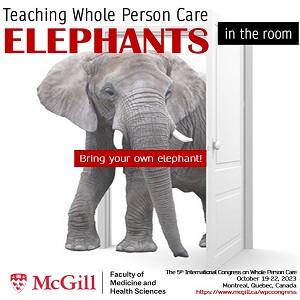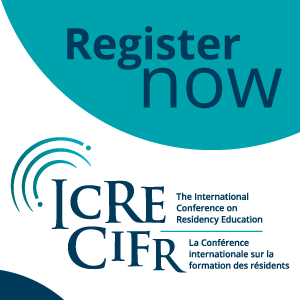Developing a dashboard for program evaluation in competency-based training programs: a design-based research project
DOI:
https://doi.org/10.36834/cmej.73554Abstract
Background: Canadian specialist residency training programs are implementing a form of competency-based medical education (CBME) that requires the assessment of entrustable professional activities (EPAs). Dashboards could be used to track the completion of EPAs to support program evaluation.
Methods: Using a design-based research process, we identified program evaluation needs related to CBME assessments and designed a dashboard containing elements (data, analytics, and visualizations) meeting these needs. We interviewed leaders from the emergency medicine program and postgraduate medical education office at the University of Saskatchewan. Two investigators thematically analyzed interview transcripts to identify program evaluation needs that were audited by two additional investigators. Identified needs were described using quotes, analytics, and visualizations.
Results: Between July 1, 2019 and April 6, 2021 we conducted 17 interviews with six participants (two program leaders and four institutional leaders). Four needs emerged as themes: tracking changes in overall assessment metrics, comparing metrics to the assessment plan, evaluating rotation performance, and engagement with the assessment metrics. We addressed these needs by presenting analytics and visualizations within a dashboard.
Conclusions: We identified program evaluation needs related to EPA assessments and designed dashboard elements to meet them. This work will inform the development of other CBME assessment dashboards designed to support program evaluation.
Metrics
References
Frank JR, Snell LS, Cate O Ten, et al. Competency-based medical education: theory to practice. Med Teach. 2010;32(8):638-645. https://doi.org/10.3109/0142159X.2010.501190
Holmboe ES, Sherbino J, Long DM, Swing SR, Frank JR. The role of assessment in competency-based medical education. Med Teach. 2010;32(8):676-682. https://doi.org/10.3109/0142159X.2010.500704
Royal College of Physicians and Surgeons of Canada. Competence by Design: Reshaping Canadian Medical Education.; 2014.
Englander R, Frank JR, Carraccio C, Sherbino J, Ross S, Snell L. Toward a shared language for competency-based medical education. Med Teach. 2017;39(6):582-587. https://doi.org/10.1080/0142159X.2017.1315066
Van Loon KA, Driessen EW, Teunissen PW, Scheele F. Experiences with EPAs, potential benefits and pitfalls. Med Teach. 2014;36(8):698-702. https://doi.org/10.3109/0142159X.2014.909588
Rekman J, Gofton W, Dudek N, Gofton T, Hamstra SJ. Entrustability Scales: outlining their usefulness for competency-based clinical assessment. Acad Med. 2015;91(2):1. https://doi.org/10.1097/ACM.0000000000001045
Gofton WT, Dudek NL, Wood TJ, Balaa F, Hamstra SJ. The Ottawa Surgical Competency Operating Room Evaluation (O-SCORE): a tool to assess surgical competence. Acad Med. 2012;87(10):1401-1407. https://doi.org/10.1097/ACM.0b013e3182677805
MacEwan MJ, Dudek NL, Wood TJ, Gofton WT. Continued validation of the O-SCORE (Ottawa Surgical Competency Operating Room Evaluation): use in the simulated environment. Teach Learn Med. 2016;28(1):72-79. https://doi.org/10.1080/10401334.2015.1107483
Sherbino J, Bandiera G, Doyle K, et al. The competency-based medical education evolution of Canadian emergency medicine specialist training. Can J Emerg Med. 2020;22(1):95-102. https://doi.org/10.1017/cem.2019.417
Stoneham EJ, Witt L, Paterson QS, Martin LJ, Thoma B. The development of entrustable professional activities reference cards to support the implementation of Competence by Design in emergency medicine. Can J Emerg Med. 2019;21(6):803-806. https://doi.org/10.1017/cem.2019.395
Royal College of Physicians and Surgeons of Canada. Entrustable Professional Activities for Emergency Medicine. Royal College of Physicians and Surgeons of Canada; 2018.
Van Melle E, Frank JR, Holmboe ES, Dagnone D, Stockley D, Sherbino J. A core components framework for evaluating implementation of competency-based medical education programs. Acad Med. 2019;94(7):1002-1009. https://doi.org/10.1097/ACM.0000000000002743
Chan TM, Paterson QS, Hall AK, et al. Outcomes in the age of competency-based medical education: recommendations for emergency medicine training in Canada from the 2019 symposium of academic emergency physicians. Can J Emerg Med. 2020;22(2):204-214. https://doi.org/10.1017/cem.2019.491
Van Melle E, Hall AK, Schumacher DJ, et al. Capturing outcomes of competency-based medical education: the call and the challenge. Med Teach. 2021;43(7). https://doi.org/10.1080/0142159X.2021.1925640
Hall AK, Schumacher DJ, Thoma B, et al. Outcomes of competency-based medical education: a taxonomy for shared language. Med Teach. 2021;43(7):788-793. https://doi.org/10.1080/0142159X.2021.1925643
Carraccio C, Martini A, Van Melle E, Schumacher DJ. Identifying core components of EPA implementation: a path to knowing if a complex intervention is being implemented as intended. Acad Med J Assoc Am Med Coll. Published online March 23, 2021. https://doi.org/10.1097/ACM.0000000000004075
Thoma B, Hall AK, Clark K, et al. Evaluation of a national competency-based assessment system in emergency medicine: a CanDREAM study. J Grad Med Educ. 2020;12(4):425-434. https://doi.org/10.4300/JGME-D-19-00803.1
Hall AKM, Rich J, Dagnone JDM, et al. It’s a marathon, not a sprint: rapid evaluation of CBME program implementation. Acad Med. 2020;95(5):786-793. https://doi.org/10.1097/ACM.0000000000003040
Carey R, Wilson G, Bandi V, et al. Developing a dashboard to meet the needs of residents in a competency-based training program: a design-based research project. Can Med Educ J. 2020;11(6):e31-e35. https://doi.org/10.36834/cmej.69682
Thoma B, Bandi V, Carey R, et al. Developing a dashboard to meet Competence Committee needs: a design-based research project. Can Med Educ J. 2020;11(1):e16-e34. https://doi.org/10.36834/cmej.68903
Thoma B, Caretta-Weyer H, Schumacher DJ, et al. Becoming a Deliberately developmental organization: using competency-based assessment data for organizational development. Med Teach. 2021;43(7):801-809. https://doi.org/10.1080/0142159X.2021.1925100
Stein M, Janetzko H, Lamprecht A, et al. Bring it to the pitch: combining video and movement data to enhance team sport analysis. IEEE Trans Vis Comput Graph. 2018;24(1):13-22. https://doi.org/10.1109/TVCG.2017.2745181
Teizer J, Cheng T, Fang Y. Location tracking and data visualization technology to advance construction ironworkers’ education and training in safety and productivity. Autom Constr. 2013;35:53-68. https://doi.org/10.1016/j.autcon.2013.03.004
Stadler JG, Donlon K, Siewert JD, Franken T, Lewis NE. Improving the efficiency and ease of healthcare analysis through use of data visualization dashboards. Big Data. 2016;4(2):129-135. https://doi.org/10.1089/big.2015.0059
Few S. Information Dashboard Design: The Effective Visual Communication of Data. 1st Editio. O’Reilly Media; 2006.
Ellaway RH, Pusic M V., Galbraith RM, Cameron T. Developing the role of big data and analytics in health professional education. Med Teach. 2014;36(3):216-222. https://doi.org/10.3109/0142159X.2014.874553
McKenney S, Reeves TC. Conducting Educational Design Research. 2nd ed. Routledge; 2019.
Reeves TC, Herrington J, Oliver R. design research: a socially responsible approach to instructional technology research in higher education. J Comput High Educ. 2005;16(2):97-116.
Chen W, Reeves TC. Twelve tips for conducting educational design research in medical education. Med Teach. 2020;4(9):980-986. https://doi.org/10.1080/0142159X.2019.1657231
Yilmaz Y, Carey R, Chan T, et al. Developing a dashboard for faculty development in competency-based training programs: a design-based research project. Can Med Educ J. 2021;12(4):48-64. https://doi.org/10.36834/cmej.72067
Boscardin C, Fergus KB, Hellevig B, Hauer KE. Twelve tips to promote successful development of a learner performance dashboard within a medical education program. Med Teach. 2017;40(8):1-7. https://doi.org/10.1080/0142159X.2017.1396306
Karami M, Langarizadeh M, Fatehi M. Evaluation of effective dashboards: key concepts and criteria. Open Med Inform J. 2017;11(1):52-57. https://doi.org/10.2174/1874431101711010052
Dolmans DHJM, Tigelaar D. Building bridges between theory and practice in medical education using a design-based research approach: AMEE Guide No. 60. Med Teach. 2012;34(1):1-10. https://doi.org/10.3109/0142159X.2011.595437
Chen W, Sandars J, Reeves TC. Navigating complexity: the importance of design-based research for faculty development. Med Teach. 2021;43(4):475-477. https://doi.org/10.1080/0142159X.2020.1774530
Van Melle E, Gruppen L, Holmboe ES, Flynn L, Oandasan I, Frank JR. Using contribution analysis to evaluate competency-based medical education programs: it’s all about rigor in thinking. Acad Med. 2017;92(6):752-758. https://doi.org/10.1097/ACM.0000000000001479
Oandasan I, Martin L, McGuire M, Zorzi R. Twelve tips for improvement-oriented evaluation of competency-based medical education. Med Teach. 2020;42(3):272-277. https://doi.org/10.1080/0142159X.2018.1552783
Lang C, Siemens G, Wise A, Gasevic D. Handbook of Learning Analytics: First Edition. Society for Learning Analytics Research.
Chan T, Sebok-Syer S, Thoma B, Wise A, Sherbino J, Pusic M. Learning analytics in medical education assessment: the past, the present, and the future. AEM Educ Train. 2018;2(2):178-187. https://doi.org/10.1002/aet2.10087
Thoma B, Ellaway R, Chan TM. From Utopia through Dystopia: charting a course for learning analytics in competency-based medical education. Acad Med. 2021;96(7S):S89-S95. https://doi.org/10.1097/ACM.0000000000004092
Olmos M, Corrin L. Learning analytics: a case study of the process of design of visualizations. J Asynchronous Learn Netw. 2012;16(3):39-49.
Bandi V, Shisong W, Thoma B. CBD Dashboard UI. GitHub. Published 2019. https://github.com/kiranbandi/cbd-dashboard-ui [Accessed Oct 1, 2021].
Watling CJ, Lingard L. Grounded theory in medical education research: AMEE Guide No. 70. Med Teach. 2012;34(10):850-861. https://doi.org/10.3109/0142159X.2012.704439
Tong A, Sainsbury P, Craig J. Consolidated criteria for reporting qualitative research (COREQ): a 32-item checklist for interviews and focus groups. Int J Qual Health Care. 2007;19(6):349-357. https://doi.org/10.1093/intqhc/mzm042
O’Brien BC, Harris IB, Beckman TJ, Reed DA, Cook DA. Standards for reporting qualitative research. Acad Med. 2014;89(9):1245-1251. https://doi.org/10.1097/ACM.0000000000000388
Sample S, Rimawi HA, Bérczi B, Chorley A, Pardhan A, Chan TM. Seeing potential opportunities for teaching (SPOT): Evaluating a bundle of interventions to augment entrustable professional activity acquisition. AEM Educ Train. 2021;5(4):e10631. https://doi.org/10.1002/aet2.10631
Mohanna K, Cottrell E, Wall D, Chambers R. Teaching Made Easy: A Manual for Health Professionals. 3rd ed. Routledge & CRC Press; 2011.
Frye AW, Hemmer PA. Program evaluation models and related theories: AMEE guide no. 67. Med Teach. 2012;34(5):288-299. https://doi.org/10.3109/0142159X.2012.668637
Published
How to Cite
Issue
Section
License
Copyright (c) 2022 Yusuf Yilmaz, Robert Carey, Teresa Chan, Venkat Bandi, Shisong Wang, Robert A Woods, Debajyoti Mondal, Brent Thoma

This work is licensed under a Creative Commons Attribution-NonCommercial-NoDerivatives 4.0 International License.
Submission of an original manuscript to the Canadian Medical Education Journal will be taken to mean that it represents original work not previously published, that it is not being considered elsewhere for publication. If accepted for publication, it will be published online and it will not be published elsewhere in the same form, for commercial purposes, in any language, without the consent of the publisher.
Authors who publish in the Canadian Medical Education Journal agree to release their articles under the Creative Commons Attribution-Noncommercial-No Derivative Works 4.0 Canada Licence. This licence allows anyone to copy and distribute the article for non-commercial purposes provided that appropriate attribution is given. For details of the rights an author grants users of their work, please see the licence summary and the full licence.












